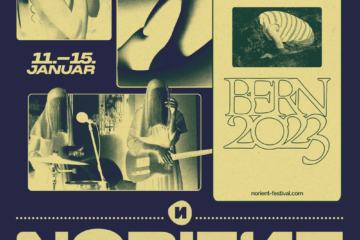Looking for who knows what
Eulogy for Tomek Chołoniewski, drummer, composer, and teacher, one of the most important figures in the Krakow improvised and experimental music scene of the last 20 years. An artist for whom the world of sound had no limits and who was equally passionate and comfortable in his favored role as an improviser, and as a performer of contemporary, electronic, and rock music. He was also a respected and popular teacher who passed on to his students not only knowledge and skills, but a love for music as well.

Of course in these circumstances the memories flood. And I have many—without a doubt it is with Tomek that I performed improvised music the most. We spent several years at the Center for Contemporary Art “Solvay,” rehearsing almost every day and playing concerts at least once a month. Tomek and I organized the first Meeting of Improvisers festival, the Laboratory of Intuition concert series… He has just always been there, from the first concert of the Improvisers Ensemble; in fact, he was the only one from a group that gathered by chance to play 20 years ago in Klub Pod Jaszczurami to take up improvised music. Together, we also created the Institute of Intuition and several other ensembles that weren’t entirely temporary—which is quite unusual among improvisers and ensembles. As I thought back it occurred to me that with Tomek I traveled farthest during my concert travels: we were together in Korea, in China, and in Japan. We wandered around Hong Kong together, in Shanghai at night, and in Seoul we wandered until we figured we were in the wrong place—and still we managed to eat a piece of sweet octopus from the street grill there. We played a whole lot of concerts, from duos to large groups; the largest of them was probably Professor Kaczyński’s orchestra conducted by „Butch” Morris. And together we drew the score for Schaeffer’s E.S Jazz… And we were together at the top of Babia Góra in the wintertime, watching the sunrise—it was cold, but magnificent, you could see not only the Tatras, but even the Bieszczady Mountains.
Well, I could probably remember for a long time, because it is now 20 years of playing together, 20 very intense years during which bands and projects were created and ended, places where we regularly worked disappeared, and after a while we met in new ones. And a lot happened, not only musically. And though I could spin a tale through this history, I would like to talk about Tomek beyond events, dates, and various artistic projects. I would like to remember him by sharing what about him was most important to me; what, you could say, charmed me. Something I think I noticed from the very beginning, and what he said aloud about himself at one point.
There was a moment a few years ago when Marcin Barski invited us—Tomek, me and several other musicians, for an „Exploratory Music from Poland” concert tour. As part of this tour a documentary was made in which each of us talked about ourselves, about the idea of our artistic activities, about what we do and what is important to us. And from the fragment about Tomek, from the interview with him, I remember one moment, because I realized that what he said about himself was special, exceptional, and it enchanted me. It was something thanks to which we managed this strange cooperation—strange because it is founded on something that isn’t there, on indeterminacy, on instability, on unpredictability, which is precisely the foundation of spontaneous improvisation. A question was asked during the interview about the reason for his own contributions as opposed to any other kind of artistic activity, and Tomek said: “Basically I’m looking for…well, basically I don’t know what I’m looking for.”
For me, this declaration was like the credo of a person possessing not only the ability to act ad hoc in unexpected circumstances, the credo of an improviser—but it was also the response of a wanderer, the response of a person who is curious about everything around the bend, who will look around this bend, with inquisitiveness, albeit without excessive expectations.
I think Tomek was a wanderer. Not a traveler, because they aim, sometimes even rush, to the predetermined goal of snapping a photo, or recording a video to put up later on YouTube. Not a conqueror, who goes somewhere just to plant his flag and say that from now on the place is his. And he was certainly not a tourist, that is, part of a herd that is transported to certain places to spend time in „paradise.” Tomek was a wanderer, and as the Chinese Book of Changes says, a wanderer’s home is the way. A wanderer must have a kind of openness and be prepared for change, because we don’t have control over the way, and from this perspective the way is not an object, but a certain mode of existence, a kind of activity without end—the road is simply the wandering itself. And it’s tough to stop the wanderer in their wandering, because to wander and the changes that follow it are their element, we could say it’s the meaning of their existence. A wanderer is curiosity itself, is looking around and quietly participating in the movement of reality, without over-imposing and obsessing over directions—directions just come by themselves because the world turns. For a wanderer, home is the way, and the way is made by walking—this quote from an ancient Chinese philosophical text speaks to the fact that we are subject to the movement of the world, also exerting influence on it by walking through it, walking down the road. And it must be an activity so subtle as to be subject to and exert its influence simultaneously, with a kind of dynamic balance between the two. And that’s how Tomek seemed to me.
And it was possible because Tomek was non-linear. Over the last few hundred years (with sources going back millennia) our culture has developed a linear system of thought and linear perception to go with it. Its characteristic features are: meticulous planning, expectation and demand, an obsessive desire to control and rule, a kind of analytical discussion of matters and understanding of the world that leads to domestication and appropriation. And Tomek was non-linear, in thinking, perception, and action alike. I could see he felt quite at home in a very undefined network of extremely diverse, colorful relations, participating in them without pressure or oppression, and with acceptance of difference and multidimensionality. Many of us noticed this; to many of us subtlety, simplicity, openness, and sociability were his hallmarks, as I can see from the remembrances published on the Web. Thanks to this non-linearity, when confronting a different world view in a conversation, he’d often say “to some degree I understand” and I have no doubt that he said it not as courtesy, but in sincerity. He participated in collective and group activities without forcing his opinion, without imposing a vision, thinking rather about the whole we were creating. Our mutual friend Keir also saw him this way, and I quote him here so he can participate in the moment of farewell: “Generous with his time and talents, eager to experiment, open to giving and receiving criticism, a good listener and an active contributor, thoughtful, inquisitive, self-reflective, playful, trusting and trustworthy, loving, oriented toward what’s best for the whole. These are the hallmarks of a good musician, a good improviser, a good teacher, a good person…in a word: our Tomek.”
I must also admit that only now, after Tomek’s departure, do I understand this statement by Woland in The Master and Margarita, which has always been important to me, but only contained a literary dimension, and now unfortunately takes on an ominous relevance; I’d say, it has materialized. Woland says to Berlioz and Homeless (Bezdomny) during their meeting at Patriarch’s Ponds: “That man is mortal is just half the trouble. The worst of it is that mortality is entirely unexpected.”
I have no words to describe what I felt when I found out about Tomek’s unexpected departure. I ask for help from the Krakow poet, Don Kopyto a/k/a Spodek: “The human soul is like a rainbow over an abyss, like a whole life, that disappears. And such a great regret as though someone’s love died out—it pierces those who remained.”
In our culture, it is customary to say goodbye to those who depart with the phrase: „Rest in peace.” But I think we will say goodbye a little differently, I prefer to say, after Keir: „Rest in sound!”
translated from Polish by Keir Neuringer









In Improvizers we trust! Lovely piece Keir. Wish I could have met this beautiful person.